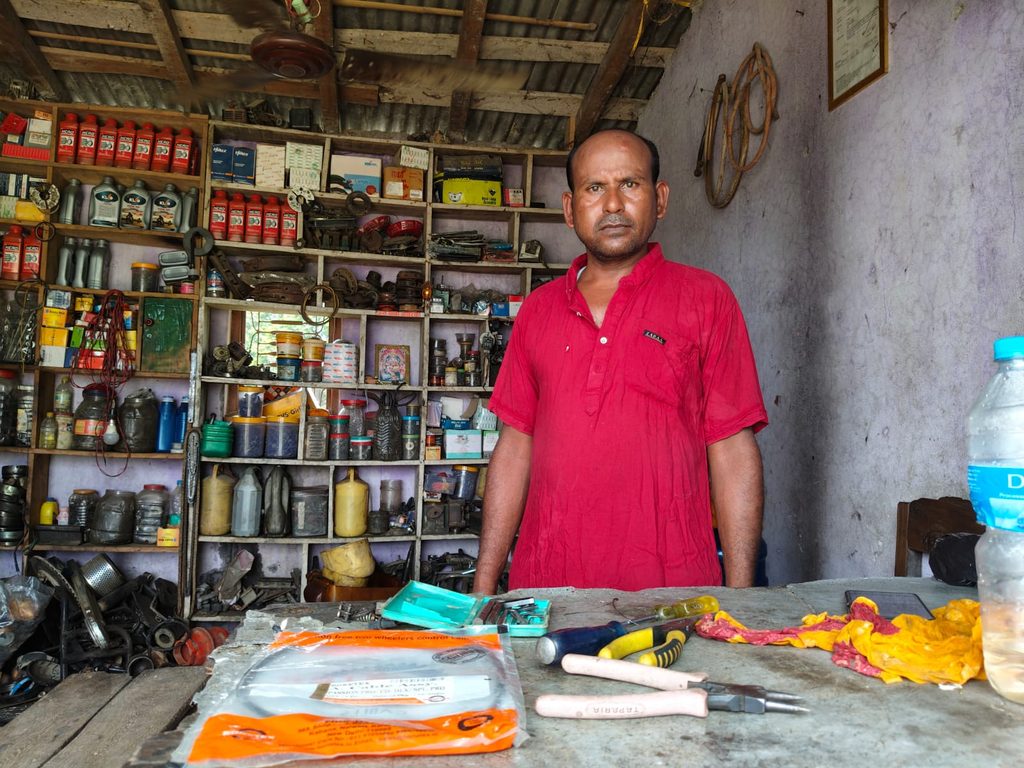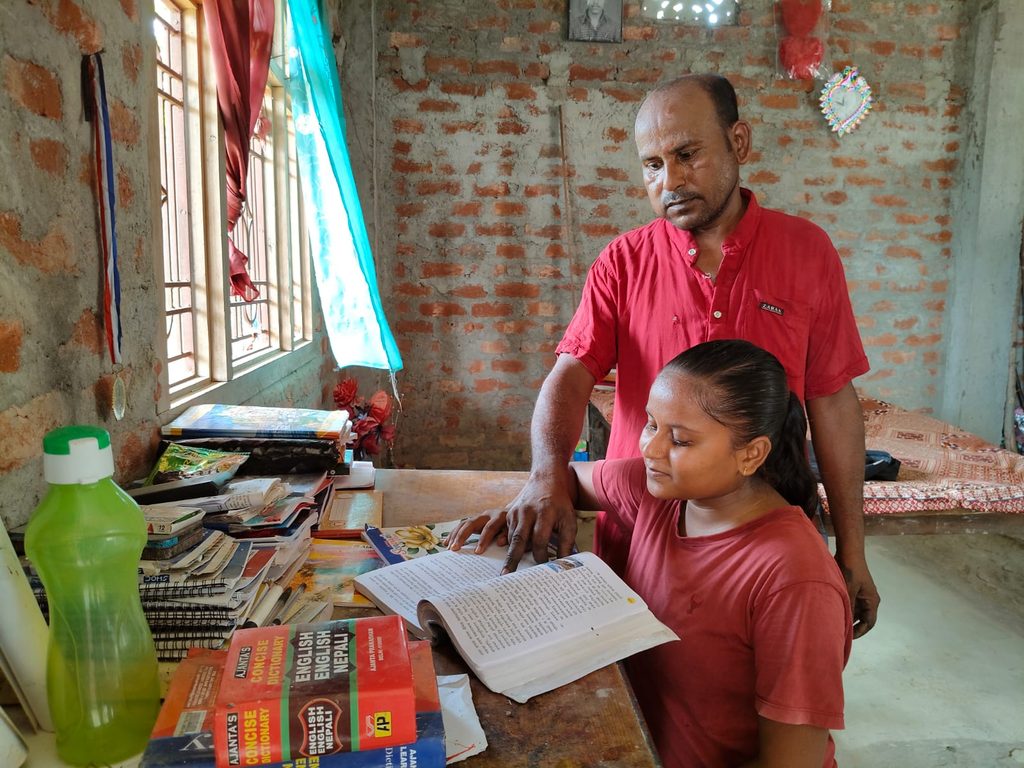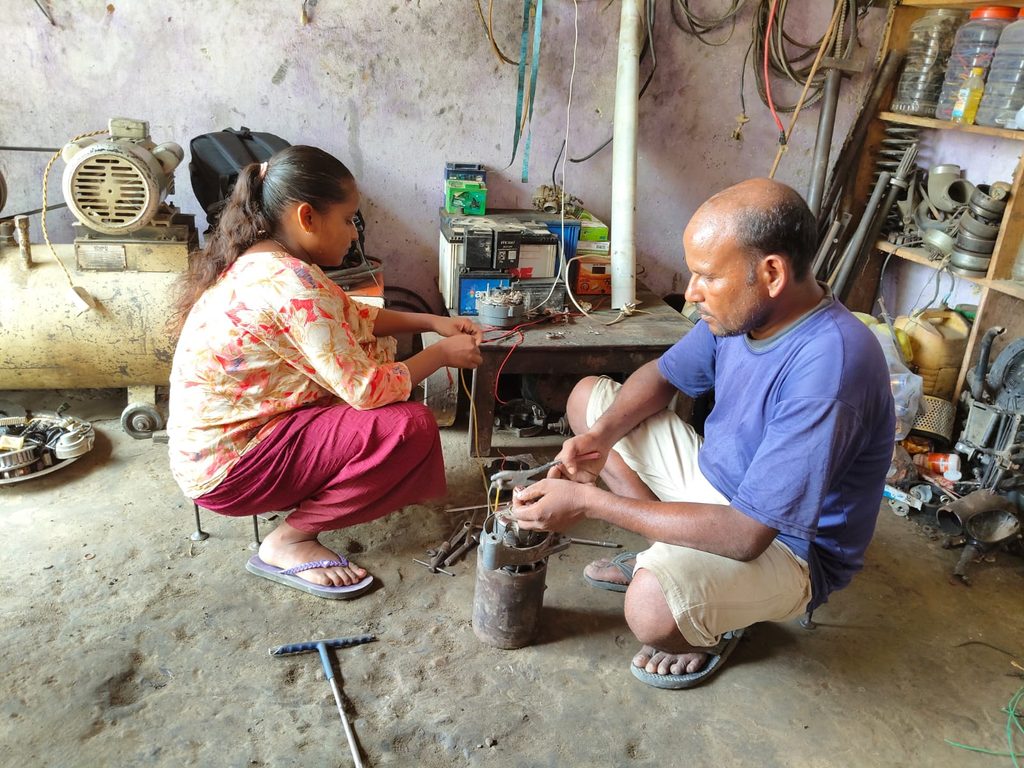Narendra a father standing strong for his daughters
This Father’s Day, we celebrate fathers like Narendra from Dhanusha. Once following traditional norms, he is now breaking barriers, sharing household work, guiding his daughters, and creating a supportive home where they can learn, lead, and dream big.

In many communities across Madhesh Province, fathers are often left out of discussions around girls’ rights, education, and well-being. But when fathers choose to engage, they can become powerful allies for change. This is the story of Narendra, who once held traditional views about gender roles. Today, he stands not only as a supportive parent to his daughters but also as a local champion for gender equality, inspiring others across his community to do the same.
From regret to realisation
Narendra, 43, from Dhanusha, comes from a modest background. After dropping out of school at age 11 due to poverty, he spent years working in factories in Nepal and India before migrating abroad to pay off family debt. He returned to Nepal with little education, financial stress, and a traditionally rooted mindset, believing household chores were women’s work and decisions for girls belonged to elders, not fathers.
Narendra attended positive parenting sessions, but he initially ignored them. Later, with encouragement from his friend, who is also a teacher, he agreed to attend the sessions.
“The session opened my eyes. I realised how my absence and silence were holding my daughters back,” said Narendra.
He wasn’t sure what to expect. But as the sessions unfolded, so did his perspective. For the first time, he began to reflect on his role as a father, not just as a provider, but as someone who could shape the future of his daughters. He listened as facilitators spoke about how critical a father’s emotional presence is in a child’s life, and how simple acts of support, a conversation, a shared task, a listening ear could help daughters, especially girls, feel safe, confident, and valued. He realised that his absence, silence, and rigid beliefs had created a distance between him and his children, especially his daughters.
“I used to think providing money and food was enough,” Narendra recalled, “but I had never thought about what they needed from me emotionally.”
“I used to think providing money and food was enough. But I had never thought about what they needed from me emotionally.”
Narendra, a father
He returned home after each session, determined to try something new.“At first, I only asked my daughters about their day. Soon we were talking about school, friends, and their dreams. It wasn’t easy, but their smiles gave me courage. Now I share the chores, cook with my wife, and help with studies. I even teach Anchal in my garage, because skills aren’t just for sons,” shares Narendra.
“The more I learnt, the more I saw myself through my daughters’ eyes. I realised the struggles they face, especially during adolescence and menstruation, which I had never spoken about before. Learning about child marriage made me question the norms I once followed. Treating sons and daughters equally now feels like a truth I can no longer ignore.”
“Those sessions gave me the chance to become the father I never had. They made me realise that I’m not just raising daughters; I’m raising leaders.”
“Those sessions gave me the chance to become the father I never had. They made me realise that I’m not just raising daughters; I’m raising leaders.”
Narendra, a father
From learning to living
Narendra didn’t just learn, he acted. Step by step, he began making changes in his daily life.
He started spending time with Alka and Anchal, asking about their school life, friends, and feelings. He initiated conversations on topics he once considered uncomfortable: puberty, menstruation, relationships, and made space for his daughters to speak freely.
Once reluctant to participate in household chores at home, he began cooking, washing clothes, and doing fieldwork alongside his wife. His actions sent a strong message to his daughters: men and women are equal partners in the home. With a firm belief that daughters deserve equal opportunity, he became an active supporter of their schooling, visiting teachers and encouraging participation in school clubs. He began buying sanitary pads for his daughters, talking openly about periods at home, challenging silence and stigma in a deeply conservative setting.
“People laughed when they saw me doing chores or talking about menstruation,” he said. “But now they come to me for advice.”
“People laughed when they saw me doing chores or talking about menstruation. But now they come to me for advice.”
Narendra, a father
A champion for daughters in his community
The transformation didn’t happen overnight. Narendra faced criticism, self-doubt, and moments where his old beliefs clashed with new responsibilities. But the visible change in his daughters pushed him forward. Anchal, now in Grade 8, is thriving; she scored second in her class and now leads the school’s child club. She has reported 2 child marriage cases via the 1098 child helpline, advocates for adolescent health, and conducts peer sessions on topics like psychological changes, self-esteem, and care.
Her younger sister, Alka, is playful and still warming up to garage work, but Narendra respects their differences. “Each child is unique. I won’t force them into roles; I will guide them.”
At home, Anchal is supported by Narendra and Lalita. Together, they have nurtured a space where a girl from a marginalised community can dream, lead, and inspire others.
“I couldn’t give my son the guidance he needed, but I am determined to give my daughters every opportunity,” says Narendra. “They will rise and I will be right behind them.”


Fathers changing norms, one home at a time
Narendra’s journey is not an isolated one; it is part of a growing wave of transformation in communities across Dhanusha. Through school-based child clubs, girls like Anchal are getting opportunities to build their confidence, learn about their rights, and take part in campaigns to prevent child marriage and promote gender equality.
But the programme goes beyond just working with girls, it recognises that lasting change must also involve families and communities. That’s why the project actively engages parents, especially fathers, through positive parenting sessions. These sessions are designed to challenge long-held gender norms, promote shared responsibility in parenting, and encourage fathers to become allies in their daughters’ growth and success.
Narendra’s transformation is a powerful example of this approach in action. By unlearning harmful gender stereotypes and embracing a nurturing, supportive role, he has become a hero in his own home and a role model in his community. His journey reflects the impact of a gender-transformative approach, one that puts girls at the centre, while bringing boys, men, and families along the path to equality.
“When a father becomes an ally, a girl’s future opens up,” says Narendra. “I stand with my daughters not just as a parent, but as their strongest supporter.”


